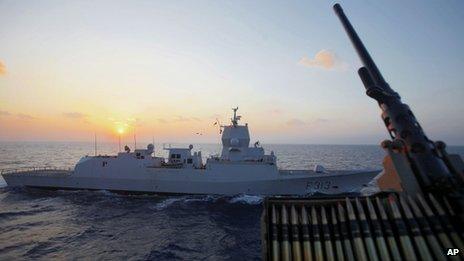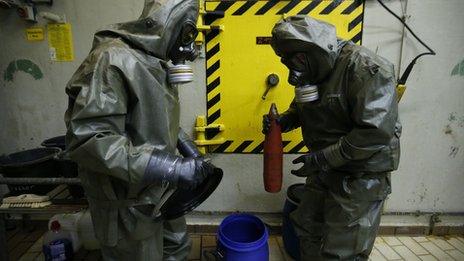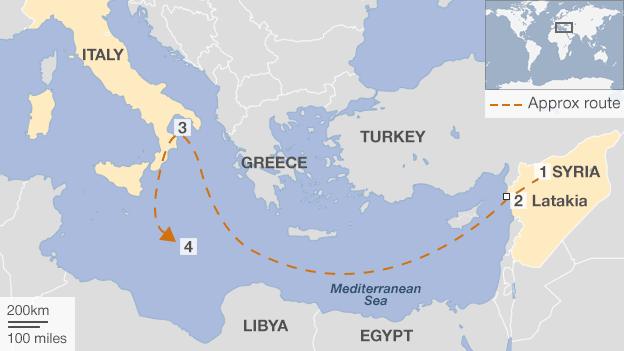Germany agrees to help destroy Syria's chemical weapons
- Published

These ships are helping to transport the chemical weapons away from Syria
Germany is joining international efforts to destroy Syria's stockpile of chemical weapons, the foreign and defence ministries have announced.
The decision is in response to a request for help from the UN and OPCW, co-ordinators of the destruction plan.
Ministers said waste from the destroyed weapons would be burned at a government facility in the town of Munster in line with environmental regulations.
Germany has until now refused to accept chemical weapons onto its soil.
But Foreign Minister Frank-Walter Steinmeier said Germany had "decided not to pull back from our responsibility".
"The destruction of Syria's chemical weapons could be the first, decisive step towards defusing the Syria conflict... It is the duty of the international community to ensure their final disposal," he added.
He said Germany had the capacity and technology to undertake this task.
Defence Minister Ursula von der Leyen said Germany "has safe technology and a lot of experience with destroying remnants of chemical arms".
"It is sensible for us to use this capability for the sake of the international community and with it, make a worthy contribution to the peace process."
The announcement was welcomed by Russia.
According to the Interfax news agency, a foreign ministry official said it was "a good contribution made by Germany to a task set before the international community".

The weapons will be destroyed by experts in Munster in full compliance with environmental regulations
The first consignment of toxic chemicals left Syria on a Danish ship early this week.
It is travelling to Italy, where it will be loaded onto a US Navy ship and shipped to international waters for destruction in a specially created titanium tank on board.
Britain has also offered to help get rid of the waste.
Syria agreed to destroy its chemical weapons in a deal brokered by the US and Russia last year.
It followed international outrage when rockets filled with the nerve agent sarin were fired at three towns in the Ghouta agricultural belt around the Syrian capital, Damascus, on 21 August.
Hundreds of people were killed in the attacks.
Western powers said only Syrian government forces could have carried out the assault, but President Bashar al-Assad blamed rebel fighters.
How the plan will unfold

1. The Syrian authorities are responsible for packing and safely transporting the chemical weapons from 12 sites across the country to the port of Latakia. Russia has supplied large-capacity and armoured lorries, while the US has sent container drums and GPS locators.
2. Russia will provide security for loading operations at Latakia, for which the US has supplied loading, transportation and decontamination equipment. China has sent 10 ambulances and surveillance cameras, and Finland an emergency response team in case of accidents.
3. Denmark and Norway are providing cargo ships and military escorts to take the chemicals to an as yet unnamed port in Italy. Russian and China will also provide naval escorts.
4. In Italy, the "most critical" chemical agents will be loaded onto the US Maritime Administration cargo ship, MV Cape Ray, to be destroyed by hydrolysis in international waters. Less-toxic chemicals will be shipped by Norwegian and Danish vessels for disposal at commercial facilities.